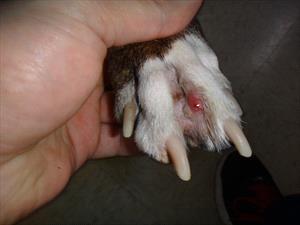Small bowel cancer in dogs
Small Bowel Cancer In Dogs. Most intestinal tumors are in the large intestine colon and rectum. Intestinal cancer is fairly uncommon in dogs and cats. Ultrasonographic abnormalities were present in 8 of 13 dogs with abnormal wall layering n 7 and. Lymphoma in a dog will affect the lymphoid tissue in the intestinal tract.
 Leiomyoma In Dogs Symptoms Causes Diagnosis Treatment Recovery Management Cost From wagwalking.com
Leiomyoma In Dogs Symptoms Causes Diagnosis Treatment Recovery Management Cost From wagwalking.com
Small intestine and cecum. Intestinal adenocarcinomas are biologically active cancer cells that originate from the glandular epithelial lining of the intestinal wall. Intestinal cancer is fairly rare in dogs. Another type of cancer is called an adenoma which may occur but is very rare. In cats the tumors are rarer than in dogs but male cats and Siamese breeds are more at risk. All dogs had small cell T-cell lymphoma confirmed within various regions of small intestine with 1 dog also having disease in abdominal lymph nodes.
The average age of dogs with cancer of the digestive tract is 69 years old.
After getting a diagnosis your veterinarian may refer you to a veterinary oncologist to determine the. Intestinal cancer is fairly uncommon in dogs and cats. Intestinal cancer mostly takes the form of a malignant tumor called adenocarcinoma which originates in the epithelial and glandular tissue. It commonly affects dogs that are older than six years of age. Plasmacytoma of the rectal wall Dog Colorectal Cancer or Tumors. In dogs the most common intestinal cancers report are adenocarcinomas leiomyosarcomas and lymphomas.
 Source: pethealthnetwork.com
Source: pethealthnetwork.com
Another type of cancer is called an adenoma which may occur but is very rare. Adenocarcinomas affect all breeds of dogs indiscriminately and it is one of. Cancers that can occur in the intestines include adenocarcinoma leiomyosarcoma lymphoma. Dogs can develop smaller benign growths polyps or adenomas in the membrane at the end of the colon near the rectum. Plasmacytoma of the rectal wall Dog Colorectal Cancer or Tumors.
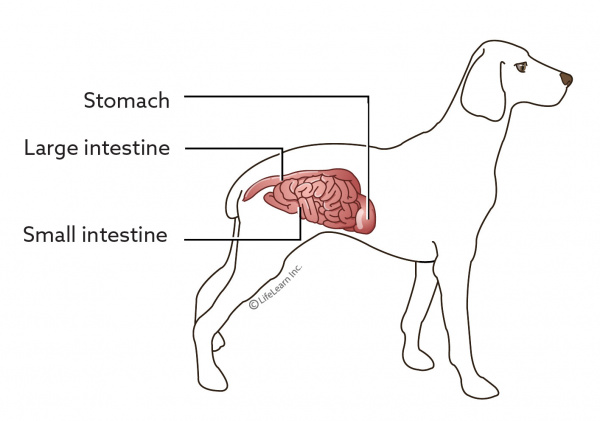 Source: vcahospitals.com
Source: vcahospitals.com
Intestinal cancer is fairly uncommon in dogs and cats. Cancerous tumors can form small polyps that can get up to 3 cm in size. Small intestine and cecum. Adenocarcinoma of the Stomach Intestine or Rectum in Dogs This type of malignant tumor growth can take place in many parts of the body including the gastrointestinal system of dogs. Leiomyosarcoma of Stomach Small and Large intestine in Dogs.
 Source: vcahospitals.com
Source: vcahospitals.com
Diarrhoea n 13 was most common. Treatment Options for Cancer in Dogs. In dogs the most common intestinal cancers report are adenocarcinomas leiomyosarcomas and lymphomas. Adenocarcinoma of the Stomach Intestine or Rectum in Dogs This type of malignant tumor growth can take place in many parts of the body including the gastrointestinal system of dogs. The age range is 2.
 Source: petcancercenter.org
Source: petcancercenter.org
After getting a diagnosis your veterinarian may refer you to a veterinary oncologist to determine the. Leiomyosarcoma of Stomach Small and Large intestine in Dogs. Intestinal cancer is fairly rare in dogs. Ultrasonographic abnormalities were present in 8 of 13 dogs with abnormal wall layering n 7 and. Leiomyosarcoma is an uncommon cancerous tumor which in this case arises from the smooth muscles of the stomach and intestines.
 Source: wagwalking.com
Source: wagwalking.com
Plasmacytoma of the rectal wall Dog Colorectal Cancer or Tumors. This type of neoplasm can invade a variety of parts of the gastrointestinal system including the rectum. Intestinal cancer mostly takes the form of a malignant tumor called adenocarcinoma which originates in the epithelial and glandular tissue. Adenocarcinoma Leiomyoma and Lymphosarcoma are the most common types of intestinal cancer in dogs. Cancerous tumors can form small polyps that can get up to 3 cm in size.
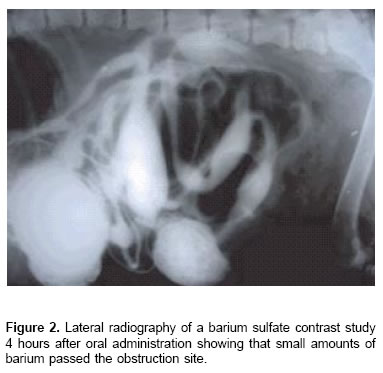 Source: scielo.org.co
Source: scielo.org.co
50 have localized peritonitis as a result of tumor rupture. Adenocarcinomas affect all breeds of dogs indiscriminately and it is one of. Different types of colon cancer in dogs. An adenocarcinoma will cause a tumor growth within the apocrine glands in a dog which are located near the rectum. It generally occurs in dogs older than six years.
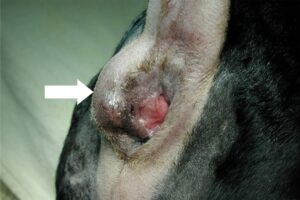 Source: bluepearlvet.com
Source: bluepearlvet.com
Lymphoma in a dog will affect the lymphoid tissue in the intestinal tract. Lymphoma in a dog will affect the lymphoid tissue in the intestinal tract. Treatment Options for Cancer in Dogs. 50 have localized peritonitis as a result of tumor rupture. Vomiting normal projectile or bloody vomit Loss of appetite and refusal to eat.
 Source: contoh-soalsmp.blogspot.com
Source: contoh-soalsmp.blogspot.com
Diarrhoea n 13 was most common. An adenocarcinoma will cause a tumor growth within the apocrine glands in a dog which are located near the rectum. Different types of colon cancer in dogs. The most common type is an adenocarcinoma. Treatment Options for Cancer in Dogs.
 Source: wagwalking.com
Source: wagwalking.com
Mean age 9 years range 4-14 years Sites. Leiomyosarcoma is an uncommon cancerous tumor which in this case arises from the smooth muscles of the stomach and intestines. Loss of weight. Adenocarcinomas affect all breeds of dogs indiscriminately and it is one of. Smooth muscle tumors are the most common intestinal mesenchymal tumor.
 Source: scielo.br
Source: scielo.br
The majority 60 of the tumors are in the lower bowel the colon and rectum. Intestinal cancer is fairly rare in dogs. Vomiting normal projectile or bloody vomit Loss of appetite and refusal to eat. Although some particular tumors lymphoma occur more commonly in the small intestines. It may invade any part of the gastrointestinal system including the stomach the small and large intestine and rectum.
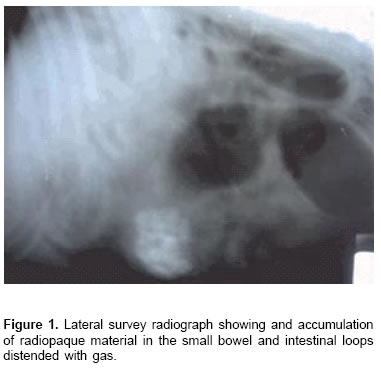 Source: scielo.org.co
Source: scielo.org.co
This type of neoplasm can invade a variety of parts of the gastrointestinal system including the rectum. None of the canine intestinal cancer types remain limited to a specific part of intestine with reports showing that cancer can be distributed all over the small and large intestine. Plasmacytoma of the rectal wall Dog Colorectal Cancer or Tumors. Lymphosarcoma which affects the gastrointestinal systems lymph nodes and adenocarcinoma which leads to the growth of one or more tumours in the bodys apocrine glands which lie parallel to each other on the rectum. After getting a diagnosis your veterinarian may refer you to a veterinary oncologist to determine the.
 Source: dogtime.com
Source: dogtime.com
The most common type is an adenocarcinoma. Although some particular tumors lymphoma occur more commonly in the small intestines. Intestinal tumors are uncommon in dogs. All dogs had clinical signs attributable to GI disease. Dogs with bowel cancer cannot properly process.
If you find this site serviceableness, please support us by sharing this posts to your own social media accounts like Facebook, Instagram and so on or you can also save this blog page with the title small bowel cancer in dogs by using Ctrl + D for devices a laptop with a Windows operating system or Command + D for laptops with an Apple operating system. If you use a smartphone, you can also use the drawer menu of the browser you are using. Whether it’s a Windows, Mac, iOS or Android operating system, you will still be able to bookmark this website.

